

Sir Ken Robinson: Do schools kill creativity? Audre Lorde on the Vulnerability of Visibility and Our Responsibility, to Ourselves and Others, to Break Our Silences. Troubling ‘Critical Reflection’in Social Work: the oppressed reflective self …. As a metaphor ‘reflection’ provokes an image of the individual looking at themselves in a mirror.
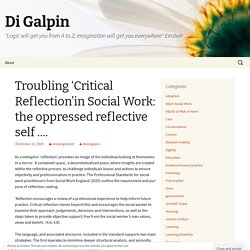
A contained space, a decontextualised place, where insights are created within the reflective process to challenge individuals biases and actions to ensure objectivity and professionalism in practice. The Professional Standards for social work practitioners from Social Work England (2020) outline the requirement and purpose of reflection, stating: ‘Reflection encourages a review of a professional experience to help inform future practice. Critical reflection moves beyond this and encourages the social worker to examine their approach, judgements, decisions and interventions, as well as the steps taken to provide objective support, free from the social worker’s own values, views and beliefs.’ (4.6; 4.8). The language, and associated discourse, included in the standard supports two main strategies. This begs the question, whose interests does this serve? Technical Rationality Further Reading. The Power of Connecting with the Right People.
The Two Big Ways Power Transforms a Person. Anecdotal evidence certainly suggests that the old cliché about power corrupting people is true.

Stories about unethical, dishonest leaders appear in the newspapers — and the history books — with alarming regularity. But do we really know if people in positions of power behave more unethically than the general population? An array of social scientists has been trying to answer that question in recent years. The answer to this question (like the answer to most such questions) is “it depends.” One thing is clear: A significant body of research demonstrates that power has transformative effects on human psychology. Vulnerable Yet Stronger—The Paradox of Strength.
“We are at our most powerful the moment we no longer need to be powerful.”
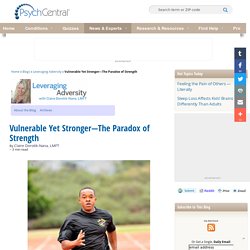
39 Communication Games and Activities for Kids, Teens, and Students. Could One Question Uplift and Unite Humanity? [ TEDx : Jon Berghoff ] Try this anywhere [ TEDx : Robyn Stratton-Berkessel ] Jon Jorgenson. We should all be feminists - Chimamanda Ngozi Adichie at TEDxEuston. Reframing imposter phenomenon by Rageshri Dhairyawan – The official blog of B... “Imposter phenomenon” – the phenomenon of feelings of persistent self-doubt, or fear of being found out as a fraud – has attracted much attention in recent years.
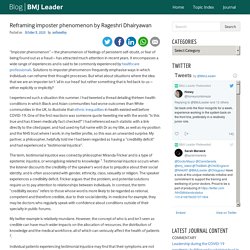
It encompasses a wide range of experiences and is said to be commonly experienced by healthcare professionals. Solutions to imposter phenomenon frequently emphasise ways in which individuals can reframe their thought processes. Victoria Spry - Full Interview - 9th April 2015. The Big 6 reflective model. Reflective writing in social work. Social Work Student Connect Wednesday Webi... The Role of Emotional Thinking in Critical Thinking — Work Faster. Work Smarter. The Work of Byron Katie. Nicole-brown.co. Why mirror neurons in your brain can make you feel. How showing vulnerability helps build a stronger team. Overcoming Obstacles to Critical Thinking. The ability to think critically is one skill separating innovators from followers.
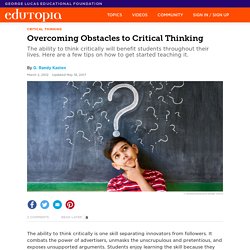
It combats the power of advertisers, unmasks the unscrupulous and pretentious, and exposes unsupported arguments. Students enjoy learning the skill because they immediately see how it gives them more control. Yet critical thinking is simple: It is merely the ability to understand why things are they way they are and to understand the potential consequences of actions. Devastating Consequences, Tremendous Opportunities. 35 Psychology-Based Learning Strategies For Deeper Learning. 35 Psychology-Based Critical Thinking Strategies by Sara Briggs, opencolleges.edu.au Have you ever considered letting your students listen to hardcore punk while they take their mid-term exam?
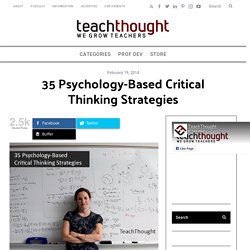
Decided to do away with Power Point presentations during your lectures? Urged your students to memorize more in order to remember more? If the answer is no, you may want to rethink your notions of psychology and its place in the learning environment. Here are 35 critical thinking strategies, straight from the mind of Sigmund Freud. 35 Psychology-Based Critical Thinking Strategies. The right way to be introspective (yes, there’s a wrong way) Valery Lemay It was Tuesday evening around 11pm.
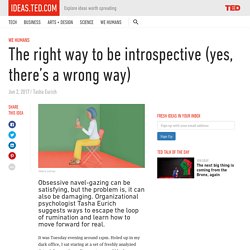
Holed up in my dark office, I sat staring at a set of freshly analyzed data. A few weeks earlier, my team and I had run a study looking at the relationship between self-reflection and outcomes like happiness, stress and job satisfaction. I was confident the results would show that people who spent time and energy examining themselves would have a clearer understanding of themselves and that this knowledge would have positive effects throughout their lives. No Pain, No Brain Gain: Why Learning Demands (A Little) Discomfort. Your First Thought Is Rarely Your Best Thought: Lessons on Thinking. The Value of Grey Thinking. One of the most common questions we receive, unsurprisingly, is along the lines of What one piece of advice would you recommend to become a better thinker?
The question is kind of cheating. The Crucial Thinking Skill Nobody Ever Taught You – The Mission. How Great Thinkers Shatter the Status Quo The German mathematician Carl Jacobi made a number of important contributions to different scientific fields during his career.
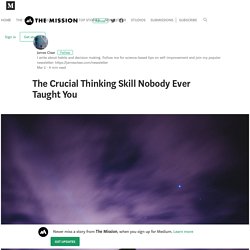
In particular, he was known for his ability to solve hard problems by following a strategy of man muss immer umkehren or, loosely translated, “invert, always invert.” Jacobi believed that one of the best ways to clarify your thinking was to restate math problems in inverse form. He would write down the opposite of the problem he was trying to solve and found that the solution often came to him more easily. Inversion is a powerful thinking tool because it puts a spotlight on errors and roadblocks that are not obvious at first glance. The Art of Wisdom and the Psychology of How We Use Categories, Frames, and Stories to Make Sense of the World. By Maria Popova.
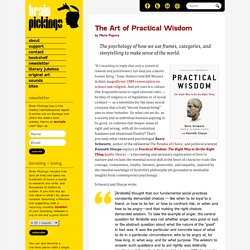
You are missed — Better Humans. “Something feels missing from my life but I can’t quite put my finger on it.”

I can’t tell you how many times I hear some variation of that every week. (It’s a lot.) 5 Step Prep to Make Essay Writing As Painless as Possible. 10 Telling Signs You're an Emotionally Intelligent Person. Emotionally intelligent people are the best people. Emotionally intelligent people are the advice-givers among their group of friends. The Good Stuff about Your Bad Stuff. Do you ever feel anxious and then worry about the anxiety? In other words, do you have anxiety about your anxiety? Why It’s So Hard to Speak Up Against a Toxic Culture. Executive Summary.
Collective intelligence. Why We Struggle with Change. The Paradox of Behavior Change. The natural tendency of life is to find stability. Practice the Change You Wish to See in the World. The Forced Heroism of the ‘Survivor’ 5 Simple Self Care Steps to Heal Shame. Be a Lady They Said. Psychology Today Australia. Phil Ebersole's Blog. 30 Things About Life I Wish I Had Known 10 Years Ago - Darius Foroux - Pocket.
30 Things About Life I Wish I Had Known 10 Years Ago - Darius Foroux - Pocket. How to Paraphrase a Paragraph. Grief. 9 Questions For Guided Introspection. Brené Brown on Blame. The Power Of Words. Manage Conflict: Identifying Your Triggers. UNDER THE SKY - Free outdoor adventures for care experienced adults. The Neuroscience of Lies, Honesty, and Self-Control. Brené Brown's brilliant explanation of Blame is a humbling Wake-Up Call. Reflective and Reflexive Practice. Reflexivity in Qualitative Research. What does if mean to be Reflexive and Reflective Professional? Reflexivity in Perception. Critical and Creative Thinking. From vulnerable people to vulnerable situations that breach human rights. The difference between kindness and human rights. Motivational interviewing: what it is and how you can use it in social work. RSA Shorts - The Power of Empathy. Studies Show That People Who Have High “Integrative Complexity” Are More Likely To Be Successful.
What it Really Means to Hold Space for Someone. “Every time you’re telling a good vs. evil story, 12 Life Lessons from a Man Who's Seen 12000 Deaths. When Do You Know You Are Emotionally Mature? 26 Suggestions. Let's Rumble. Emotions-language-signs-behaviors. Esoteric Empyre - Swing on the Spiral. Brené Brown: The power of vulnerability. MyEtymology.com - A universal etymology dictionary.